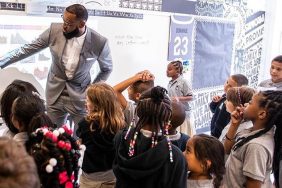
One of the main activists for student athlete education is University of North Carolina educator Mary Willingham. She is featured in Schooled and I spoke with her by phone from the UNC campus, where she still has an office. She continues to post and speak out on her website Paperclassinc.com.
CraveOnline: One of the big revelations in Schooled is if athletes are being asked to flat out miss class, is that a gross misrepresentation of the scholarship as a whole?
Mary Willingham: I would say yes. That’s a gross misrepresentation of the contract. The contract is fraudulent, so yes.
I think we’ve all heard of athletics overlooking academic deficiencies, but this is the reverse. Students actually want to learn and they’re being forced to go play instead.
That’s right. I don’t know if you watched the ESPN piece with Deonte Williams. Deonte says, “This wasn’t about making Deonte a better person or a better student or watching out for his academic progress. This was about you need to take this class because it’ll help you stay eligible.”
Take an easy class so he can get a good enough grade?
This is a paper class system. This is a no show paper class system that Carolina had in place for almost 20 years.
Take a class he doesn’t have to physically attend?
Right.
Are students also given restrictions on what curriculum they can take if it’s going to conflict with athletics?
Yes, absolutely. So they’re shuttled into a few different majors that we know will work around the football and basketball schedules.
I’m not aware how other types of scholarships work, whether it’s musical or purely academic scholarships. Are those more flexible or open about what curriculum they’re giving a scholarship for?
If you’re getting a drama scholarship then you’re going to major in drama. If you’re going to come in as a music scholarship you’re going to major in music but you’re also vetted from the standpoint of can you do the core curriculum? Can you do general college work? So you can talk to anyone here in the drama or music department and they’ll tell you that they don’t bring in special admits because they know they won’t be successful here. So if they want them to be working with them in the theater or playing in one of our bands or orchestras, they’re going to make sure that they’re also up to academic standard. We don’t do that in the athletic world. We don’t care about that. We just want them because they’re the best running back or the best center or we need them as a pitcher on the baseball field. The priorities are just different.
So it really doesn’t matter what their major is, and because it doesn’t matter, the sports department is going to push or require them to take the curriculum that serves them the best?
Right. That’s right. They’re not real students, not the D1 football and basketball players for the most part. You know, race is a real issue here that’s swimming just below the surface and no one likes to talk about the fact that, as Taylor Branch said, it’s a civil rights issue. I ask all the time, students that I work with here at Carolina, if our basketball and football players were white, would we be treating them this way? It’s just a question.
Assuming their athletic skills were the same, would they be treated differently?
I mean, I think it’s socioeconomic so I think that plays a big piece in it. Usually some student will bring that up. It’s a representation issue that our white students here usually are not first generation college students for the most part. There are some but it’s a pretty small group, so they have access to information resources that a lot of our minority students don’t have, even our minority non athletes. Many more of them are first generation students here in the state of North Carolina.
Do you think if a white student got a basketball scholarship and said, “But I want to take these courses,” they would be given that syllabus? And a black student might be told they have to take other courses instead?
It’s possible. I suppose it depends on the academic ability of the white male versus the black male, although we know from our national literacy standards that in the 8th grade, black males in this country are reading at grade level only 10% of the time. Where white males, it’s closer to 50% of the time. So we already know that there’s academic discrepancies that are pretty obvious out there. I guess it would depend on a lot of different variables, and we’ve looked at those because we’re looking at filing a scomplaint with the Office of Civil Rights with regards to these paper classes. I was in D.C. taking a look at some of these numbers and these statistics and it does look like over a 20 year period, African-American males were shuttled into the paper class system, the bogus system 90-95% more than any white student athletes. There’s a huge discrepancy there.
You’re still employed at North Carolina.
It’s amazing. I’m sitting in my office, I do advising in the afternoon. I do graduation advising so they’ve given me full access to records so that I can clear students for graduation. Who thought that was a good idea? I don’t know, but yes, I still work here. I have a grievance in play and the whistleblower folks in D.C. at the government organization have been helping me but I think my time is coming to be over here. I think our irreconcilable differences have grown too great for me to continue but I’ve promised students that I was going to finish the semester. I have a couple of classes. I have about 62 students and a grad assistant who’s finishing the semester as well.
So you are specifically speaking out against North Carolina practices?
That’s correct, and in general the NCAA. I have a declaration in the O’Bannon case as well on behalf of the plaintiffs, so.

Well, I don’t but when I worked for seven years in the athletic department, I met maybe two or three students who told me they only came to play sports and they didn’t come to go to college anyways. So my experience is telling me that young people understand the importance of an education and that they really wanted to get one, but if you watch that ESPN clip, you can find it at my website PaperclassInc.com. We post everything that we do, but anyway he said that he thought that players didn’t really understand what was happening necessarily while they were here. They were just doing what the adults were telling them. I have three kids. My boys I think at the age of 17, 18, 19 might just do what everyone’s telling them because we’ve already brainwashed them into thinking they’re going to play pro. I think that’s a myth that these students don’t really care about their education. I think they do and I think their families do as well, if they have families.
And I wasn’t saying I thought it was a majority. I was wondering if there were any who liked the system.
I can remember three guys in particular that just didn’t care, but sometimes I wonder too if that was just a macho kind of cover for the fact that they had been wounded as learners and they didn’t think they were smart and they didn’t think they could learn or maybe somebody told them that along the way.
I was shocked to find out so many athletes weren’t able to eat. I remember being in college and having a meal plan. Are the athletes not even given access to the dining halls?
So they do have some swipes on the dining hall cards, but that’s for lunch during the semester and then they also have training table for breakfast and dinner, at least the football players. My experience was by the end of the semester they’re out of food and the training table is closed and they’re all looking for some other student to swipe them into the cafeteria. Other students have leftover meals at the end of the semester, but I think it’s really amazing that all the money we make off these guys and yet they don’t really have the real cost of attendance.
My kids always call me, I have the three kids, and they always call me around finals. One’s already graduated from college. She’s a nurse in the Navy but she did too. They always call me around finals, “I ran out of money. I need some more money.” So it seems like it’s kind of a normal thing in college life anyways around the end of the semester, but these guys don’t have any parents for the most part that they can call and get an extra hundred bucks or whatever, so it’s pretty sad.
It seems like a pretty major oversight in athletics because they won’t be any good on the field if they’re undernourished.
Right, so it’s not during the season. I think during the season they’re well taken care of, but then when the season is over and all their coaches are out recruiting or on vacation, but the guys are still here, that’s a different story.
I see, it’s once they’re not needed anymore they’re left to fend for themselves.
Yeah.
What else is important from the education perspective?
I think the other piece that’s really critical for me is if you come to college woefully underprepared, so how prepared would it have to be for someone to come here and not be able to do the academic work? I think middle school. Middle school, 5th grade, 6th grade, 7th grade, somewhere between 5th grade and 9th/10th grade, if that’s your reading level and writing level and kind of where you’re doing math, is it really a legitimate contract to say we’re giving you an education? Because we don’t have any classes that remediate those years that were missed for one reason or another. So we’re putting these guys in classes that are four, five, six years above the grade level that they’re working at. That’s a problem.
What would be a solution to that problem? There’s no quick way to make up those years, is there?
Well, there’s not a quick way to make up those years but the CAP Act, one of the bills that’s floating around right now, which there’s three floating around Congress and I think two of the three actually have my education recommendations in them, which is this: If any of us, any of the universities admit a student that’s one standard deviation or more below the regular admission standards, that student needs to have an intensive remedial program for the first 15 months that they’re on campus and they need to be pre and post tested to prove that they’re college ready by the end of those 15 months. And they shouldn’t be playing during that time. They should redshirt and they should be allowed to practice 10 hours a week or something like that. I think that’s what we put in there. The NCAA has to pay for that program.
So if you really want this athlete, you have to groom them educationally first.
Yeah, and you have to guarantee that they get a five year scholarship, not a four year. If you get rid of that student, you lose that scholarship for those five years. So in other words, if you’re going to take one of these guys, you need to think really hard about it because you’re going to get them for the whole five years unless they decide to leave, but the responsibility is going to be on the university to make it a legitimate contract.
If you end up leaving North Carolina, would you look for another job in education?
I don’t know. I’m going to probably do some lobbying. I’m going to do some literacy work. I can teach reading. I will probably join up with the Bill Friday legacy literacy program that’s here at the university but I probably won’t be hired back by the university. It’s hard to really say. The next three weeks might play some of this out because the chancellor’s supposed to speak with me. They’re supposed to answer my grievance which was handed to them on July 1 of last year. It’s supposed to be a 90 day process but it’s lasted a little bit longer than that. So I’ve got a lot of balls in the air. I could really give up my day job and still be busy full time. I don’t know that I’d make any money but it’s not really important to me anyway.
You could certainly be busy, but can you afford to be a full time lobbyist?
Yeah, I pretty much can.
Photo Credit: Getty






